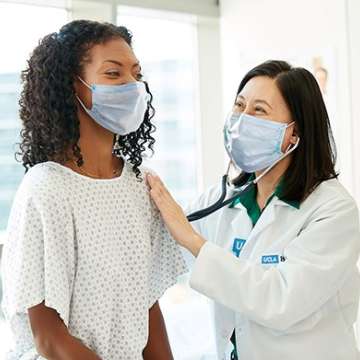Medical Chaperones
Chaperones for sensitive exams and procedures

At UCLA Health, we know some medical exams and procedures are more sensitive than others. We want you to be comfortable during all exams and procedures.
We have trained chaperones to help make sure sensitive exams and procedures are done in a safe, comfortable and professional way.
If you ever feel uneasy or you need more information about what will happen during your exam, please ask us. We are here to help.
Frequently asked questions
What is considered a "sensitive" exam or procedure?
Any physical exam of the male or female genitals or rectum or female breasts is considered "sensitive." These include exams of the female breasts, pubic/groin region (for hernia), vulva and vagina, penis and scrotum, and rectum.
What does the chaperone do?
The chaperone is a specially trained member of the UCLA Health team. Their job is to ensure patient and provider comfort, safety, privacy, security and dignity during these exams or procedures. The chaperone will stand in a location where he or she can observe what is going on and assist as needed.
Can I request a chaperone for exams that are not sensitive in nature?
Yes. You can request a chaperone for any type of exam.
Can I decline to have a chaperone present during my exam or procedure?
Yes. Adults and patients who are 12 years and older and can make their own medical decisions can decline a chaperone. Patients can opt out when they arrive at their appointment.
For children 8 or younger, the parent or guardian may act as the chaperone and stay in the room.
For all patients older than 8, a UCLA chaperone must serve in that role. However, the child's guardian may decline the presence of the chaperone for a child older than 8 and younger than 12.
The health care provider may also decide not to perform an exam or procedure unless a chaperone is present.
Can I request a chaperone of a specific gender?
Yes. If you prefer a chaperone of a specific gender, let us know when you arrive for your appointment. We will do our best to honor your request. If you have any questions or concerns, please speak to the clinic manager.
For ALL sensitive exams, you should expect:
- An explanation of the exam, including why it is needed, what the provider will do, and what it may feel like.
- Privacy to undress. You should NOT be asked to undress in front of a provider or other staff member.
- You should be offered a covering (gown or sheet/drape) if your body is exposed.
- The provider should NEVER make sexual remarks, hints or jokes.
- You have the right to refuse any portion of an exam or stop it at any time.
You are in charge of your body.
Your privacy
We value your privacy and respect your right to dignity during all exams. As a patient at UCLA Health, you should expect:
- The door will be closed during your exam. Only the people involved in your exam should be present during your care.
- The provider and/or staff member will wash their hands or use hand sanitizer before and after delivering care. Gloves will be worn whenever there is a chance to come into contact with open wounds, blood and/or bodily fluids. Gloves are not required for touching skin only.
- The provider and/or staff member will explain the exam or procedure to you. They may ask questions about your medical history that are related to the exam or procedure.
- The provider and/or staff member will ask permission prior to touching you. They will explain what to expect during your visit.
- A medical chaperone will be provided for all sensitive exams and procedures, and if requested.
Please speak up if you feel uncomfortable or notice any odd behavior during your exam or procedure.
Detailed descriptions of what to expect during each type of sensitive exam are included in the below patient brochures.
Download information as a PDF in the following languages:
Download the Pediatric Sensitive Exam Brochure in the following languages:
Download the Notice of Chaperone Policy in the following languages:
How to report sexual harassment
If you have experienced sexual harassment, please report it.
The UCLA Title IX Office protects people’s privacy, while also fulfilling its obligations to respond appropriately to all reports it receives about sexual harassment. In some situations, certain laws and University policies may require disclosure of reports to others, such as other University officials, licensing boards, law enforcement, or other agencies.
To speak with a Title IX officer, please call . You may also submit an online report at .
If you are unsure if you want to file a report, we recommend you contact one of the following confidential resources first for advice and support:
These offices are not required to report instances of sexual harassment to the University.
The University reviews all reports of sexual harassment in accordance with the University's Sexual Violence and Sexual Harassment Policy and other applicable policies. See additional reporting options available to you:
Section 1557 of the Patient Protection and Affordable Care Act
